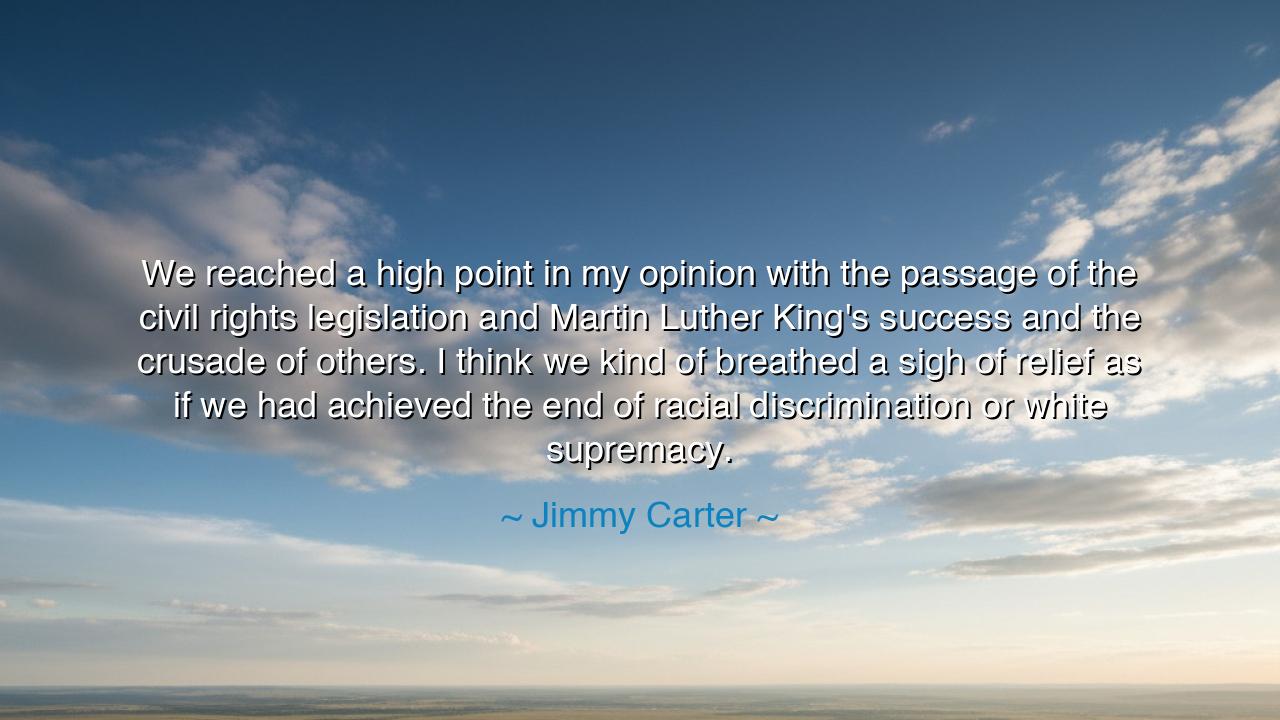
We reached a high point in my opinion with the passage of the
We reached a high point in my opinion with the passage of the civil rights legislation and Martin Luther King's success and the crusade of others. I think we kind of breathed a sigh of relief as if we had achieved the end of racial discrimination or white supremacy.






Hear now the words of Jimmy Carter, once President and long a servant of peace, who declared: “We reached a high point in my opinion with the passage of the civil rights legislation and Martin Luther King’s success and the crusade of others. I think we kind of breathed a sigh of relief as if we had achieved the end of racial discrimination or white supremacy.” These are words of triumph mixed with warning, a song of victory tempered by lament. For Carter speaks of a great moment in history when the chains of oppression were struck, but also of the peril that comes when men believe the struggle has ended while injustice yet endures.
The civil rights legislation was indeed a mountain climbed, a victory earned by blood, tears, and relentless courage. The marches, the boycotts, the speeches—these were not mere political gestures but battles fought on the field of human dignity. When Dr. Martin Luther King Jr. stood and thundered about his dream, it was not only his dream but the dream of countless generations who had borne the weight of chains and the sting of exclusion. And when laws were passed, when signs of segregation were torn down, the world seemed for a moment to breathe free.
Yet Carter’s wisdom pierces deeper: we “breathed a sigh of relief as if” the work was finished. But evil does not die so swiftly. White supremacy, rooted in centuries of power and prejudice, cannot be erased by ink upon paper alone. Laws may shift the landscape, but the hearts of men are slower to change. To mistake a great victory for the final victory is to let the old enemy rise again in silence, unseen and unchallenged.
History itself shows this cycle. After the American Civil War, slavery was abolished, and many believed a new dawn had come. Yet from its ashes rose Jim Crow laws, lynchings, and new chains forged in the shadow of the law. Again, in the 1960s, triumph came with civil rights legislation, and yet Carter reminds us: too many sighed in relief, believing the battle done. But the struggle against injustice is not a single war, but a lifelong crusade, requiring vigilance across generations.
The story of King himself is proof. Though he saw mighty victories, he also warned in his final days that the work was far from complete. He spoke of poverty, economic injustice, and systemic oppression that still gripped the land. He declared that the dream was not yet fulfilled, that the victory of laws must be followed by the victory of equality in practice. His words echo Carter’s, reminding us that we must not mistake a milestone for the destination.
The lesson for us is this: never let relief become complacency. Celebrate victories, yes, but do not fall asleep in their comfort. For as long as injustice lives in the shadows, as long as any man or woman suffers because of the color of their skin, the work remains unfinished. We must not only change laws, but minds; not only topple systems, but heal hearts. Success in justice is never final—it must be renewed daily.
Practical actions lie before us. Learn the history not as distant memory but as living reality. Speak against prejudice when you see it, even in subtle forms. Build bridges across divides, listen to voices long silenced, and lift the oppressed with your own strength. Do not say, “It is finished,” when the work of justice is still in your hands. Let your sigh of relief be followed by a call to action.
Thus Carter’s words stand as both celebration and warning. We reached a high point, yes, but the mountain range is vast, and many peaks remain. Let each generation press forward, not content with partial victory, but striving until equality and dignity are not dreams, but daily bread for all. For the struggle against discrimination is not the tale of one era, but the duty of all time.






AAdministratorAdministrator
Welcome, honored guests. Please leave a comment, we will respond soon